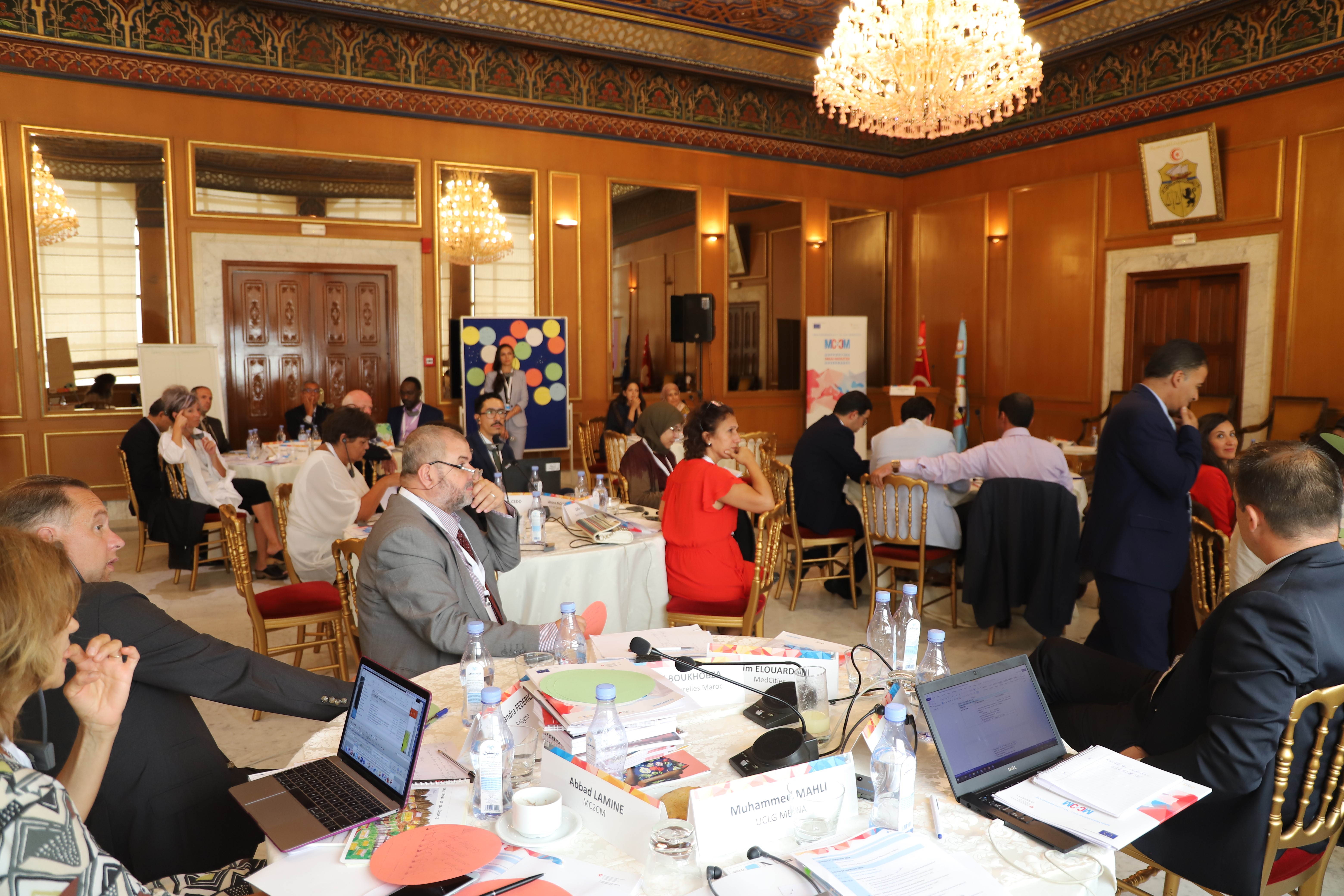October 2019
 MC2CM team, Secretariat, mc2cm@city-to-city.org
MC2CM team, Secretariat, mc2cm@city-to-city.org

Since 2015, the Mediterranean City-to-City Migration project builds its activities around 3 pillars, which are being promoted under the project's second phase (July 2018- March 2021):
- Dialogue through a Peer-to-Peer approach, mixing various learning methodologies and tools, tackling specific themes related to challenges faced by municipalities in the area of migration governance and related local policies;
- Knowledge through the development of City Migration Profiles, which are publications coordinated by partner cities and involving local actors. They present data and information related to the local migration context and introduce future priorities to be addressed by local stakeholders;
- Action through a call for proposals fostering city-targeted actions, enhancing migration governance and city planning strategies, establishing city expert networks and pilot projects in cities of the Southern Neighbourhood.
The cities of the growing local network at the core of the MC2CM project are selected on the basis of their urban migration context, geographic balance and size. So far, the project includes 15 cities and one network of local authorities: Amman, Beirut, Casablanca, FAMSI, Lisbon, Lyon, Madrid, Naples, Oujda, Rabat, Sfax, Sousse, Tangiers, Tunis, Turin and Vienna.
Yet, more than 150 representatives of 30 municipalities and 10 local authority networks have contributed and learned from the MC2CM project and its activities in Phase II first year of implementation. Cities in Africa are starting to acknowledge their role as hosting territories and express increasing interest in the project's learnings, whereas interest in Sub-Saharan Africa has also risen, linking up with Phase II 's objective of enhanced south-south cooperation.
The specific composition of the dialogue dimension was determined jointly at the Kick off meeting hosted by the City of Vienna on 17-18 October 2018. During this kick off, participating cities identified 13 priority topics for dialogue:
- City data on migration
- Urban citizenship
- Inclusive neighbourhoods: public spaces and livelihoods
- Diaspora engagement in LED
- Working with civil society
- Migrants' right to adequate housing
- Homelessness
- Communicating on migration
- Use of culture for inclusion of migrants
- Tackling discrimination in accessing public services
- Competition for talent – city attractiveness
- Working with private sector on migration issues
- Unaccompanied minors
Based on these priorities, several types of events were organized to enhance cities' knowledge in these fields and to inspire their future actions in relation to migration governance.
At the international level, three Peer-Learning Events gathered 40-60 participants on the following topics:
- Communications on Migration: An Issue of Local Governance (hosted by the Municipality of Tunis, 18-19 September 2018)
- How to build knowledge on urban migration: Innovative tools and practices to face data challenges (hosted by the Greater Amman Municipality, 19-20 March 2019)
In parallel, a technical visit of representatives of the cities of Sousse and Sfax to the Greater Amman Municipality was organized with a focus on "Urban planning and public services in migration contexts"
- Building trust through strengthened cooperation: the role of civil society in the urban governance of migration (hosted by the Municipality of Sfax, 25-26 June 2019)
Building on the international context of the GCM and the Migration week (Marrakech, December 2018), the Africities Migration Day (Marrakech, 21 November 2018) provided an opportunity for the project's first High Level Event of Phase II including 3 political forum sessions and a workshop:
- Session 1 – Migration in Africa and the World: Challenges and Prospects
- Session 2 – Contribution of Migration to Development: Myths and Realities
- Session 3 – Global Compact for safe, orderly and regular migration: What involvement of local and territorial authorities?
- Workshop: Urban migration, experiences and recommendations from the Mediterranean cities
At the national level, the project supported the organisation of a national seminar on "Local dimensions of migration: basic services, communication and multi-stakeholder coordination" (Tangiers, 14 November 2018). This event helped capitalise on the experiences of the RECOSA project (implemented by the GIZ) and to reflect on the way forward for the Moroccan Network of Intercultural Cities (supported by the CoE).
Furthermore, the project partners held 4 webinars which tackled in particular:
- Introduction to MC2CM – trajectory, lessons and future
- Housing Migrants part I: Homelessness & Migration
- Housing Migrants part II: addressing discrimination in the housing sector and current housing best practices
- Children on the Move: Including Unaccompanied Minors
Besides the creation of City Dashboards (soon available on the "i.Map Migration Urban Hub") the knowledge dimension of the project featured scoping missions to the project's new cities and the hiring of local experts for the cities' migration profiles (to be presented at the World Urban Forum, February 2020).
Within the action dimension of the project, the first call for proposals, Call for Targeted City Actions (January 2019), was launched to foster rights-based urban migration governance systems and to advance social cohesion in the Euro-Mediterranean region.
In a region where regional institutions and national governments fail in their capacity to set a shared Euro-Mediterranean migration policy, local authorities remain in many cases the first responders to migration challenges. Cities' capacities need to be increased and recognised so they can act as full actors of migration governance. In this sense, MC2CM will continue to support municipalities in effectively addressing migration challenges by expanding their expertise and capacities through peer-to-peer dialogues, city-specific migration knowledge and targeted technical actions.


